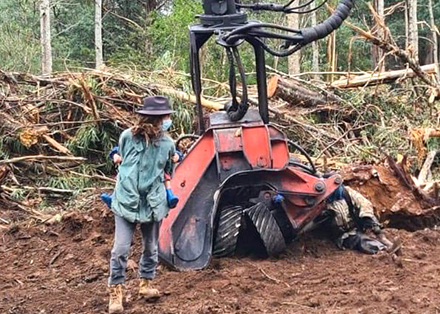New regulations that will expand the types of offences for which charities could be deregistered have been widely welcomed by the timber industry. The changes to the regulation will empower the Commissioner of the Australian Charities and Not‑for‑profits Commission (ACNC) to investigate charities engaging in or promoting serious unlawful acts of trespass, vandalism, theft or assault and threatening behaviour. Source: Timberbiz
The Australian Forest Product Association believes the reforms to charities regulations could strip extremist groups of their charitable status if they commit or incite criminal activities.
AFPA Chief Executive Officer Ross Hampton said AFPA respected the right of any individual to engage in lawful, peaceful protests. However, this activity should not disrupt another Australian’s right to work in a safe environment.
“Forestry operations are regular targets for these illegal activities, costing the industry millions of dollars a year in disruptions, and distress to forestry workers who are often intimidated, threatened and harassed by protestors,” Mr Hampton said.
AFPA made a submission supporting the reforms to the Australian Charities and Not-for-profits Commission, following an alarming escalation in the dangerous and illegal conduct of extremists.
“Just last year in Tasmania a number of long metal spikes were driven into trees about to be harvested. Fortunately, the concealed spikes were discovered just before the logs went through a sawmill. Had they been run through a saw, spinning at enormous speed, it could have meant death or serious injury for plant operators nearby,” Mr Hampton said.
“And, just recently in Victoria, we had a disturbing case of a young child being brought into an active harvest site. These vandals have to be stopped before someone is seriously hurt or killed, and clearly the existing legal deterrents are not enough,” Mr Hampton said.
“We commend the Federal Government for standing up for workers. We hope these reforms will empower the Charities regulator to take strong action against activist groups masquerading as charities that are engaged in criminal conduct and strip them of this privilege if they cross the line.”
Forest & Wood Communities Australia chairman Steve Dobbyns said forest communities were sick and tired of being targeted by corporate activism’s unlawful conduct.
“We hope this announcement will lead to real action,” he said.
“Legitmate forestry operations are routinely subjected to action by activist groups who abuse the right to protest and their charity status for financial and political gain.
“They raise their profiles to attract donations by wilfully and illegally invading workplaces, abusing forest workers, and making false claims about the impacts of forestry in Australia.
“We just hope there is more to this announcement than Government posturing, as there are existing regulations governing charities which, from what we have seen, are not being enforced.”
Mr Dobbyns said FWCA fully supports the right to protest and encourages freedom of speech but was concerned that current intimidation of forestry workers by militant protesters had gone way beyond environmental concern.
“The men and women who work in forestry operations are constantly dismayed by the level of irrational vitriol they are subjected to on an almost a daily basis,” he said.
“It is the result of corporate activist organisations using the 10s of millions of dollars it attracts from deceiving the public into donating money and the concessions they receive under the Charities Act to fund professional marketing spin.
“Make no mistake that corporate activism is big business in Australia and the Charities Act is being exploited.
“They don’t want people to know that Australian forestry meets the most rigorous standards in the world and is conducted in a miniscule 0.06% of our forests each year,” he said.
“Instead, they want to make people believe that unless they donate to their organisations, trees won’t grow back.
“Meanwhile, they encourage radical activists to break the law and engage in activity which directly contravenes the Charities Act.
“It’s time forest workers and communities were given the comfort of knowing regulators will stop protecting activism and start enforcing fair and reasonable regulations.”






